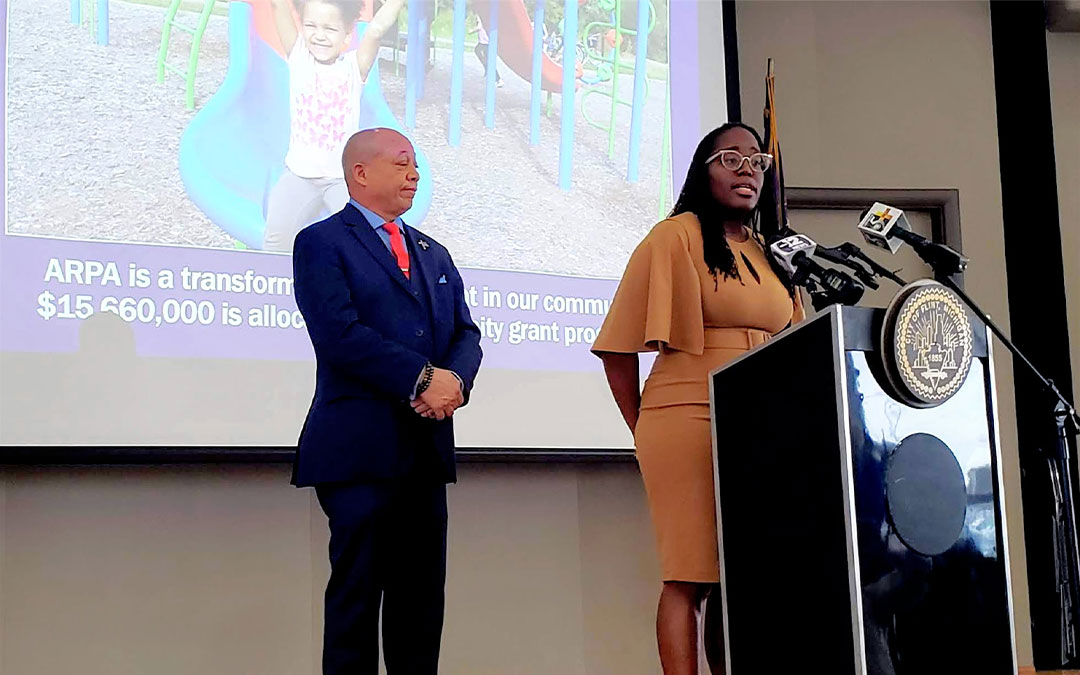The City of Flint has allocated $15.6 million of the city’s American Rescue Plan Act (ARPA) funds for Community Grants. Applications are open now for eligible organizations to compete for funds to serve Flint residents in three priority program areas: housing and blight elimination, public health, and economic development.
Mayor says 40% of the ARPA money is already spent.
At a press conference Monday, January 23, announcing the details of the community grants program, Mayor Sheldon Neeley said 40 per cent of the ARPA funds granted to the city have already been spent. A total of $94.7 million was awarded under the federal aid program designed to help the nation recover from the devastating effects of the COVID-19 pandemic.
The $15.6 million allocated for community grants will assist eligible nonprofits, businesses, and community-based organizations in administering programs such as home repair and improvement, or youth job training for Flint residents, and would be widely publicized to ensure they are accessible.
Neeley said the City of Flint will identify Flint-based organizations who have subject matter expertise, as well as the capacity and experience to deliver services to Flint residents equitably.
Official information about the ARPA Community Grant Programs application is available at cityofflint.com/ARPA.
Residents are encouraged to visit the website to learn about it.
The City of Flint administration developed the official ARPA community grant application alongside many partners, including compliance consultants Ernst & Young, city council members, and philanthropic partners who have provided technical assistance, Mayor Neeley said.
Neeley also said that in addition to the community grants portion of the $15.6 million, economic development grant programs will also be forthcoming,
Neeley was joined at the press conference on the grants program by the City’s Chief Financial Officer, Rob Widigan; Chief Resilience Officer Lottie Ferguson; and representing City Council, Councilperson Ladel Lewis (Ward 2).
Later that evening the City Council met for their regularly scheduled meeting. Among their agenda items was a presentation on the Community Grants program by Lottie Ferguson.
Councilperson Dennis Pfeiffer (Ward 8) tersely noted to Ferguson, “I’m not pleased with the application.” Pfeiffer implied the application process was complicated due to the fact an account must be created.
Pfeiffer blasted several questions to Ferguson. “It’s not full transparency,” he said. “Who is being invited? What type of programs outside of the main bullet points are included? Until this gets full transparency I’m not voting for any of this back door stuff.”
Ferguson assured the council that five agencies are readily available to assist potential applicants, including navigating the application process and gathering correct documents and tax forms.
“This is not our job to micromanage this money” – Judy Priestley
Councilperson Judy Priestley, responding to her colleagues and members of the public, noted, “This is not our [city council] job to micromanage this money [the ARPA funds]. We are lucky to be at the table [to discuss the ARPA funds].”
Councilperson Pfeiffer retorted, “We, as a body, have fiduciary responsibility. To say we are lucky to have a seat at the table, we absolutely should be at the table.”
A point of contention with some council members was that the ARPA Community Grant program allows only for organizations and businesses — but not individuals — to apply. Council members asked for some of the ARPA money to be used for individual home repairs.
Ferguson explained that it is not possible for the city to disburse funds directly to residents. Rather, she offered, the city is looking for local organizations and businesses that can act as a fiduciary to disburse the funds for individual home repairs, i.e., Habitat for Humanity or the United Way.
A heated debate lasted for well over an hour. At one point, Councilpersons Eric Mays (Ward 1) and Pfeiffer (Ward 8) left their seats for several minutes to speak privately off to the side of council chambers.
Dysfunction, racial slurs, and name calling
The debate of the ARPA Community Grant program took place during the Special Affairs Committee meeting beginning at 4:30 p.m. chaired by Councilperson Ladel Lewis (Ward 2).
The meeting gradually spiraled out of control and didn’t end until well after 11 p.m. Toward the end of the evening racial slurs, accusations, indecorous behavior called out by other council members including several moments of audience members shouting out to council.
Councilperson Eric Mays was warned twice by the Committee Chairperson Lewis for using racial slurs including “handkerchief head Negro.”






